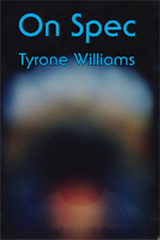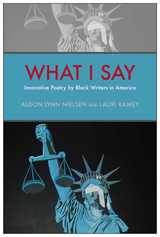2 books by Williams, Tyrone

On Spec
Tyrone Williams
Omnidawn, 2007
Tyrone Williams reveals that every act of communication is a speculation, and that the spectacles we must use to see and assess it—those of our own particular condition and conditioning—are never without qualifying contour and coloration. Williams is a keen observer of the distortions of such lenses, as the titles of the two sections of this collection suggest—first is an “Eshuneutics” (interpretation purportedly infused with an Eshu’s sensibility). But the trickster’s eye can turn to mock even its own powers of analysis, as Williams deftly demonstrates by calling the second section “Pseudo-eshuneutics.” While the issues that Williams confronts come directly from an attempt say what it might mean to understand aspects of the African American condition of diaspora in the United States, these poems also implicate and illuminate the speculative enterprise that we each venture into whenever we attempt to articulate what we see and what we believe about it. At once immediately readable, intensely meditative, and brilliantly braced with philosophical reference, these tours through our human need to speak, and to understand, travel beyond the boundaries that constrain most poetry collections. Poems, plays, plays upon the making of such genre distinctions, are only some of the locations one will visit in these pages.
[more]

What I Say
Innovative Poetry by Black Writers in America
Aldon Lynn Nielsen
University of Alabama Press, 2015
What I Say: Innovative Poetry by Black Writers in America is the second book in a landmark two-volume anthology that explodes narrow definitions of African American poetry by examining experimental poems often excluded from previous scholarship. The first volume, Every Goodbye Ain’t Gone, covers the period from the end of World War II to the mid-1970s. In What I Say, editors Aldon Lynn Nielsen and Lauri Ramey have assembled a comprehensive and dynamic collection that brings this pivotal work up to the present day.
The elder poets in this collection, such as Nathaniel Mackey, C. S. Giscombe, Will Alexander, and Ron Allen, came of age during and were powerfully influenced by the Black Arts Movement, and What I Say grounds the collection in its black modernist roots. In tracing the fascinating and unexpected paths of experimentation these poets explored, however, Nielsen and Ramey reveal the tight delineations of African American poetry that omitted noncanonical forms. This invigorating panoply of work, when restored, brings into focus the creatively elastic frontiers and multifaceted expressions of contemporary black poetry.
Several of the poets discussed in What I Say forged relationships with members of the L=A=N=G=U=A=G=E poetry movement and participated in the broader community of innovative poetry that emerged in the late 1970s and early 1980s and continues to exert a powerful influence today.
Each volume can stand on its own, and reading them in tandem will provide a clear vision of how innovative African American poetries have evolved across the twentieth century and into the twenty-first. What I Say is infinitely teachable, compelling, and rewarding. It will appeal to a broad readership of poets, poetics teachers, poetics scholars, students of African American literature in nonnarrative forms, Afro-futurism, and what lies between the modern and the contemporary in global and localized writing practices.
The elder poets in this collection, such as Nathaniel Mackey, C. S. Giscombe, Will Alexander, and Ron Allen, came of age during and were powerfully influenced by the Black Arts Movement, and What I Say grounds the collection in its black modernist roots. In tracing the fascinating and unexpected paths of experimentation these poets explored, however, Nielsen and Ramey reveal the tight delineations of African American poetry that omitted noncanonical forms. This invigorating panoply of work, when restored, brings into focus the creatively elastic frontiers and multifaceted expressions of contemporary black poetry.
Several of the poets discussed in What I Say forged relationships with members of the L=A=N=G=U=A=G=E poetry movement and participated in the broader community of innovative poetry that emerged in the late 1970s and early 1980s and continues to exert a powerful influence today.
Each volume can stand on its own, and reading them in tandem will provide a clear vision of how innovative African American poetries have evolved across the twentieth century and into the twenty-first. What I Say is infinitely teachable, compelling, and rewarding. It will appeal to a broad readership of poets, poetics teachers, poetics scholars, students of African American literature in nonnarrative forms, Afro-futurism, and what lies between the modern and the contemporary in global and localized writing practices.
[more]
READERS
Browse our collection.
PUBLISHERS
See BiblioVault's publisher services.
STUDENT SERVICES
Files for college accessibility offices.
UChicago Accessibility Resources
home | accessibility | search | about | contact us
BiblioVault ® 2001 - 2024
The University of Chicago Press









